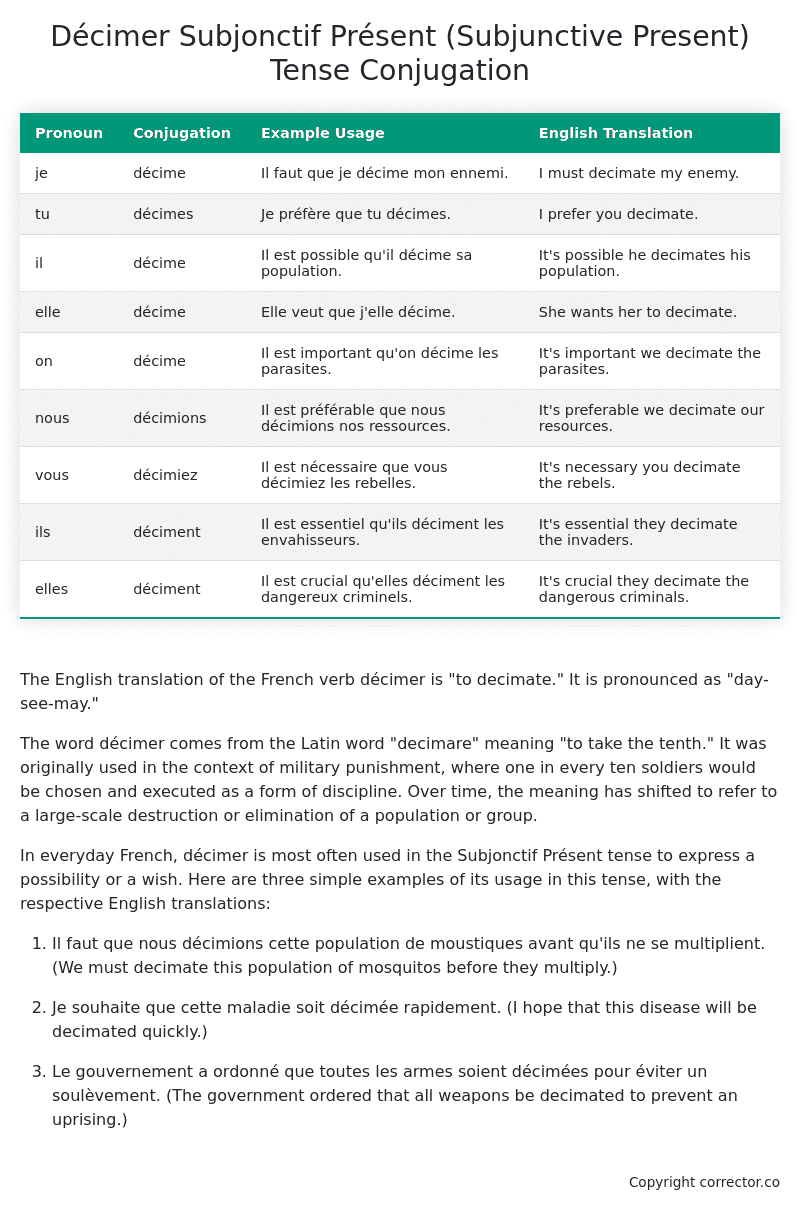Subjonctif Présent (Subjunctive Present) Tense Conjugation of the French Verb décimer
Introduction to the verb décimer
The English translation of the French verb décimer is “to decimate.” It is pronounced as “day-see-may.”
The word décimer comes from the Latin word “decimare” meaning “to take the tenth.” It was originally used in the context of military punishment, where one in every ten soldiers would be chosen and executed as a form of discipline. Over time, the meaning has shifted to refer to a large-scale destruction or elimination of a population or group.
In everyday French, décimer is most often used in the Subjonctif Présent tense to express a possibility or a wish. Here are three simple examples of its usage in this tense, with the respective English translations:
-
Il faut que nous décimions cette population de moustiques avant qu’ils ne se multiplient. (We must decimate this population of mosquitos before they multiply.)
-
Je souhaite que cette maladie soit décimée rapidement. (I hope that this disease will be decimated quickly.)
-
Le gouvernement a ordonné que toutes les armes soient décimées pour éviter un soulèvement. (The government ordered that all weapons be decimated to prevent an uprising.)
Table of the Subjonctif Présent (Subjunctive Present) Tense Conjugation of décimer
| Pronoun | Conjugation | Example Usage | English Translation |
|---|---|---|---|
| je | décime | Il faut que je décime mon ennemi. | I must decimate my enemy. |
| tu | décimes | Je préfère que tu décimes. | I prefer you decimate. |
| il | décime | Il est possible qu’il décime sa population. | It’s possible he decimates his population. |
| elle | décime | Elle veut que j’elle décime. | She wants her to decimate. |
| on | décime | Il est important qu’on décime les parasites. | It’s important we decimate the parasites. |
| nous | décimions | Il est préférable que nous décimions nos ressources. | It’s preferable we decimate our resources. |
| vous | décimiez | Il est nécessaire que vous décimiez les rebelles. | It’s necessary you decimate the rebels. |
| ils | déciment | Il est essentiel qu’ils déciment les envahisseurs. | It’s essential they decimate the invaders. |
| elles | déciment | Il est crucial qu’elles déciment les dangereux criminels. | It’s crucial they decimate the dangerous criminals. |
Other Conjugations for Décimer.
Le Present (Present Tense) Conjugation of the French Verb décimer
Imparfait (Imperfect) Tense Conjugation of the French Verb décimer
Passé Simple (Simple Past) Tense Conjugation of the French Verb décimer
Passé Composé (Present Perfect) Tense Conjugation of the French Verb décimer
Futur Simple (Simple Future) Tense Conjugation of the French Verb décimer
Futur Proche (Near Future) Tense Conjugation of the French Verb décimer
Plus-que-parfait (Pluperfect) Tense Conjugation of the French Verb décimer
Passé Antérieur (Past Anterior) Tense Conjugation of the French Verb décimer
Futur Antérieur (Future Anterior) Tense Conjugation of the French Verb décimer
Subjonctif Présent (Subjunctive Present) Tense Conjugation of the French Verb décimer (this article)
Subjonctif Passé (Subjunctive Past) Tense Conjugation of the French Verb décimer
Subjonctif Imparfait (Subjunctive Imperfect) Tense Conjugation of the French Verb décimer
Subjonctif Plus-que-parfait (Subjunctive Pluperfect) Tense Conjugation of the French Verb décimer
Conditionnel Présent (Conditional Present) Tense Conjugation of the French Verb décimer
Conditionnel Passé (Conditional Past) Tense Conjugation of the French Verb décimer
L’impératif Présent (Imperative Present) Tense Conjugation of the French Verb décimer
L’infinitif Présent (Infinitive Present) Tense Conjugation of the French Verb décimer
Struggling with French verbs or the language in general? Why not use our free French Grammar Checker – no registration required!
Get a FREE Download Study Sheet of this Conjugation 🔥
Simply right click the image below, click “save image” and get your free reference for the décimer Subjonctif Présent tense conjugation!

Décimer – About the French Subjonctif Présent (Subjunctive Present) Tense
Formation of the Subjonctif Présent
Common Everyday Usage Patterns
Interactions with Other Tenses
Summary
I hope you enjoyed this article on the verb décimer. Still in a learning mood? Check out another TOTALLY random French verb conjugation!


